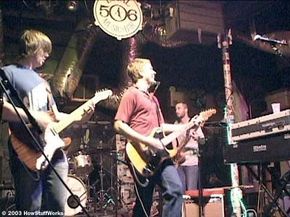The Major Players
The major players in the recording industry are:
- Songwriter - The songwriter is the person (or people) who write the lyrics and melody for songs.
- Publisher - The publisher is the person (or company) who works with the songwriters to promote their songs. Publishers usually get either partial or total ownership of the song copyright, known as "assignment" or "transfer" of the copyright. They pitch the songs to record labels, television or movie producers, or anyone else who may be interested in it. They then license the rights to use the song and charge fees. Those fees are typically split 50/50 with the songwriter.
- Performer - Anyone who licenses the song in order to publicly perform it is the performer, or performing artist. The performer doesn't have control of the song (it's controlled by the songwriter or publisher) or the recording (it's controlled by the record company).
- Recording company (record label) - The recording company creates, markets and distributes the recordings.
- Performing rights organization (PRO) - A performing rights organization is an association, corporation, or other entity that licenses the public performance of nondramatic musical works on behalf of the copyright owners. The major performing rights societies are The American Society of Composers, Authors and Publishers (ASCAP), Broadcast Music, Inc. (BMI), SESAC, Inc. (formerly the Society of European Stage Authors and Composers) and SoundExchange.
- Mechanical rights agency: The right to record a song -- mechanical rights -- for most publishers is obtained through the Harry Fox Agency in the United States, or the Canadian Mechanical Rights Reproduction Agency (CMRRA) in Canada. These agencies issue the mechanical royalties for songs, keep track of them, make sure the users pay, and provide statements to the publishers. They charge a set percentage of gross royalty collections for their service.
Advertisement
